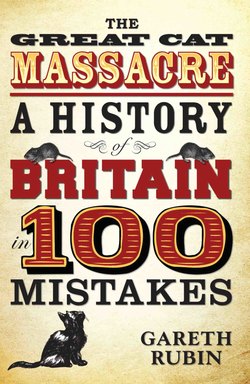Читать книгу The Great Cat Massacre - A History of Britain in 100 Mistakes - Gareth Rubin - Страница 11
На сайте Литреса книга снята с продажи.
BUT DID HE DO IT? – THE DEATH OF LORD CASTLEREAGH, 1822
ОглавлениеRobert Stewart, Viscount Castlereagh, was a controversial fellow. For decades he was one of the most influential men in Europe – and therefore the world. His reputation rested on his position as Britain’s Foreign Secretary, which allowed him to build the European system of diplomacy that delivered peaceful but conservative government across the continent. He was also hated by poets.
For example, after the 1819 Peterloo Massacre of political radicals, blamed on the reactionary Cabinet of which Castlereagh was a leading member, Shelley wrote:
I met murder on the way
He had a masque like Castlereagh
Very smooth he looked, yet grim;
Seven bloodhounds followed him
All were fat; and well they might
Be in admirable plight,
For one by one, and two by two,
He tossed them human hearts to chew
Which from his wide cloak he drew.
Shelley died in July 1822. Had he lived another month he might have perked up a little to hear that Castlereagh had been acting distinctly oddly. In an interview with George IV, the minister told the King that he was being watched by a mysterious servant. His ominous words were: ‘I am accused of the same crime as the Bishop of Clogher.’
The Bishop, Percy Jocelyn, had, the previous month, been defrocked and prosecuted after he was found in the back room of the White Lion in Haymarket with his trousers and a Grenadier Guardsman around his ankles. Sensibly, Jocelyn ran away to Scotland, to become a butler. A popular ditty of the time described the tale:
The Devil to prove the Church was a farce
Went out to fish for a Bugger.
He baited his hook with a Soldier’s arse
And pulled up the Bishop of Clogher.
It is uncertain, however, whether Castlereagh (a) really had been foolish enough to do it with a Grenadier Guardsman and was being blackmailed, (b) had not been foolish enough to do it with a Grenadier Guardsman but was being blackmailed anyway or (c) was completely mad.
The King, very concerned, told him to speak to a doctor. Perhaps he was worried that Castlereagh had picked up a dose of something he wanted to get rid of, or maybe he thought the minister was one seat short of an overall majority. Certainly, the Duke of Wellington, a chum of the Foreign Secretary, believed it was the latter and wrote to Castlereagh’s physician, asking him to see his patient as soon as possible.
Castlereagh, in a state of agitation, retired to his home in Kent, where his wife, Amelia, took away all the razors to stop him killing himself. Ever resourceful, however, on 12 August 1822 he managed to find a letter opener and cut his own throat. His doctor found him bleeding and recorded his dying words: ‘Bankhead, let me fall upon your arm. Tis all over.’ It put an unambiguous end to an exceptional career.*
Yet, even after dying, Castlereagh managed to influence legislation. An inquiry into his death was held a few days later and ruled that he was mentally ill at the time. This was a charitable judgment because had the ruling been ‘suicide’, he would have had a stake driven through his heart and been buried in unconsecrated ground – possibly at a crossroads in order to prevent his ghost from haunting anyone who lived nearby (crossroads were known to confuse ghosts, who wouldn’t know which way to go).
At the time, many people compared the fact that Lord Castlereagh was buried with full rites in Westminster Abbey with the fact that one Abel Griffiths, a 22-year-old law student who killed himself soon after Castlereagh, was buried in ‘drawers, socks and a winding sheet’ at the intersection of Eaton Street, the King’s Road and Grosvenor Place in London. (At least, according to The Annual Register, a record of the year’s political and social events, which has been published continually since 1758, ‘the disgusting part of the ceremony of throwing lime over the body and driving a stake through it was dispensed with’.) The result of the public outrage was an 1823 law banning crossroad burials altogether, so much good came from his death.
On the other hand, Shelley’s friend Byron wrote:
Posterity will ne’er survey
A nobler grave than this:
Here lie the bones of Castlereagh
Stop, traveller, and piss.
